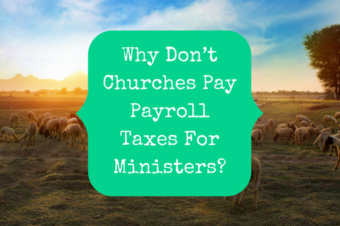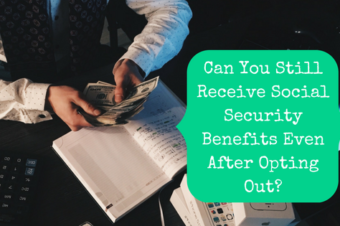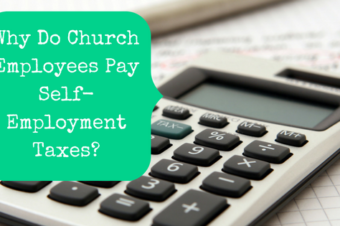
So, you’re entering the ministry and you’re excited. You’re excited to devote your life to God’s work. You’re excited to make an eternal impact on the world. And you’re excited to do your taxes in a completely new way.
No, not really. If that kind of thing excited you, you would be a CPA instead of a pastor. Even though you’re new to pastoral ministry, you’ve probably already heard a thing or two about clergy taxes from seasoned veterans. And there’s a good chance that there are conflicts in what you’ve heard.
One of the biggest areas of confusion when it comes to a minister’s taxes relates to Social Security and Medicare. There are a lot of myths floating around, both inside and outside the church. Let me see if I can clear things up for you.
How Social Security & Medicare Taxes Work
Social Security and Medicare taxes are paid by all workers and deducted directly from their paychecks. Because of this, they are often called payroll taxes. Traditionally, the employee pays half of the taxes and the employer pays half of the taxes. Self-employed people, being both employee and employer, have to pay both halves, or the total tax.
For 2019, the Social Security tax rate is 6.2% each for employee and employer and the Medicare tax rate is 1.45% each. That means that 7.65% is automatically deducted from every employee’s paycheck. Self-employed people have to pay 15.3% total.
Social Security has a wage-base limit. That means that the Social Security tax only applies to the first $132,900 of income. Above that, the Social Security tax no longer applies. Medicare taxes always apply. In fact, they actually get higher if you earn a lot. High-income earners have to pay an extra Additional Medicare Tax, so they have an extra 0.9% withheld once their income exceeds $200,000.
Do Pastors Have To Pay Social Security & Medicare Taxes?
Social Security and Medicare taxes are pretty straightforward for most people. Not for pastors, though. Both how they pay them and whether or not they even have to are very unique for pastors. Unique, meaning complicated and causing lots of confusion.
First, let’s address whether pastors even have to pay Social Security and Medicare taxes. For everyone else, it’s required. They have no choice in the matter. But, pastors have a choice. At least regarding their ministerial income.
If you can honestly say, “I am conscientiously opposed to, or because of my religious principles I am opposed to” the acceptance of public insurance, then you can opt out. You only have a brief window of time where this option is available and you have to fill out an IRS form and follow their process. And, if you opt out, it’s permanent. You can never opt back into Social Security for your ministerial income. (Though you still may be able to receive benefits even after opting out.) For more information, follow the links in this paragraph.
How Do Pastors Pay Social Security & Medicare Taxes?
Thus, at the beginning of your ministry, you have the opportunity to opt out of the Social Security and Medicare programs and their taxes related to your ministerial income. Even if you opt out, any secular jobs you hold will still be subject to payroll taxes.
But what if you don’t opt out? Does it work for you just like it does for everyone else? No way! That would be too easy!
All pastors have to pay Social Security and Medicare taxes as if they were self-employed. Even if you work for a church and receive a W-2. And you have no choice in the matter, it’s the law. Churches aren’t even allowed to withhold payroll taxes for pastors. (Some non-pastoral church employees also have to pay their taxes this way as well.) If you want to learn more about these crazy rules, follow the links in this paragraph.
How do pastors actually pay these taxes, then, if they can’t do it as employees? Well, throughout the year, you should either be paying estimated quarterly taxes or having your church withhold taxes (technically, only income taxes) from your paycheck. Then, when you file your tax return, you have to fill out Schedule SE to calculate your Social Security and Medicare taxes.
On your tax return, your Schedule SE taxes are added together with your income taxes for your final tax bill. Because of this, even though your church can’t withhold payroll taxes for you, they can withhold extra income taxes to make up the difference. If you end up owing money, it means your church isn’t withholding enough or your estimated payments were too low. If you get a refund, it means the opposite.
There you have it, that’s how Social Security and Medicare taxes work for pastors. If you have further questions, ask them in the comments or send me a quick email!




9 Responses
William R. Grabicki
March 12, 2020I understand the concept about pastors & Social Security. My basic question is if pastors have to comply with SECA, and the taxes for Social Security & Medicare are figured, based upon the W-2 wage or based upon the net earnings of the self employed pastors?The Self-Employment Contributions Act (SECA) of 1954 is a tax law that requires the owners of small businesses–such as S corporations, partnerships, and sole proprietorships–to pay a tax of 15.3 percent of their net income from self-employment to cover their own Social Security, Medicare, and Old Age Survivors and …Feb 24, 2020
Get back when you get the chance.
Bill Grabicki
Amy
March 13, 2020Bill,
If a pastor is a common law employee and receives a W-2, then the pastor would calculate SECA based on the W-2 income plus any housing allowance received. If the pastor is self-employed and files Schedule C, then SECA would be calculated based on the Schedule C income plus any housing allowance received.
Al
October 12, 2021As a minister I have always done my own taxes. I am still currently serving a church and also receiving Social Security benefits. For whatever reason, there were several years I listed my income on Schedule SE as a church employee. Once I figured out I was doing this wrong I listed it in the proper place on Schedule SE. Should I try to correct this with the IRS? Has this affected how much I get in Social Security benefits?
Amy
October 13, 2021Al, if you reported the correct amount of earnings for Social Security and their earnings history for you is correct, then there shouldn’t be any problem. I would recommend setting up an account at ssa.gov to verify the earnings history that they have for you and if you find any errors, calling them to correct it.
Al
October 14, 2021I did have the correct amount, but just put it on the wrong line. I do have ssa.gov and irs.gov accounts and check them regularly. As far as calling the IRS, I have found that to be a total waste of time and a test of my patience. Thanks for your advice.
Amy
October 19, 2021If your earnings history is accurate, I wouldn’t worry about it. I wouldn’t want to try to call the IRS either!
Gene Zick
November 6, 2023My question is-does the Pastor/church pay social security and medicare taxes on the on cash salary or the total salary package including housing, car and educational allowances?
Amy
November 7, 2023Gene, pastors must pay Social Security & Medicare taxes on both salary and housing. For the others, how they are set up based on IRS rules determines their taxability. Here is the IRS publication that discusses it: https://www.irs.gov/publications/p15b#en_US_2023_publink1000193668